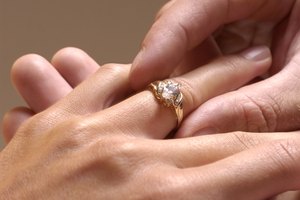Do You Legally Have to Return the Engagement Ring if Getting Divorced?
By Beverly Bird

Thinkstock Images/Comstock/Getty Images
Most states' legislative codes are pretty concise about how courts divide marital property in a divorce. The problem with engagement rings is they do not represent a clear cut example of marital property. One spouse purchases the ring and gifts it to the other prior to marriage, not after. Most states don't have definitive statutory rules for what becomes of the ring if the couple later divorces, but there are trends in how courts generally rule.
Separate Property
Some states view engagement rings as the separate property of the spouse who received the gift, provided the couple actually got married after it was given. Prior to the wedding, most state courts will return the ring to the party who purchased it because it's a conditional gift. One partner gives the ring in contemplation of marriage. If the marriage doesn't occur, the condition hasn't been met. A wedding reverses this scenario. After the bride has met the condition, the ring is her separate property and its value is not divisible in a divorce. This is the trend of case law in states such as Florida and Minnesota.
Marital Property
Other states, such as North Carolina, view the ring as marital property. In these jurisdictions, neither spouse gets to keep the value of the ring in its entirety; rather, it's apportioned between them. An appraisal is typically required to determine the value of the ring, but the accepted rule is that it should equal approximately two months' salary. If an engagement ring is worth $5,800, for example, the spouse who received the ring can keep it, but she might have to relinquish property or assets worth $5,800 to the other spouse, assuming a 50/50 division of marital property.
Marital Misconduct
Some states consider marital misconduct or fault when dividing property between divorcing spouses. If case law in these states doesn't lean toward awarding the ring to the receiving spouse as her separate property, division of its value might depend on which spouse's behavior brought about the end of the marriage. For example, if a spouse had an adulterous affair and this caused the breakup of the marriage, a court might be more likely to either return the ring to the innocent spouse or compensate him for it with additional marital property. However, rings usually only make up a small portion of marital estates, so this might not affect the overall disposition of marital property to a great extent, unless the judge factors marital misconduct into that division as well.
Family Heirlooms
If the ring belonged to the groom's family, this can further complicate the matter. Ideally, the couple might have made an agreement prior to the marriage, such as a prenuptial agreement, which provides for return of the ring to the spouse's family. But not all spouses enter into prenuptial agreements, so the issue may come down to the discretion of a judge. Rules regarding inheritances might apply. Almost all states view inheritances as the separate property of the spouse receiving the bequest. Although the gifting spouse may not have actually received the ring by bequest, this might still guide a court's decision to return the ring to the groom and his family. However, apportionment of its value would depend on that state's case law. If the divorce is amicable, the receiving spouse might agree to return the ring in exchange for another asset of comparable value.
References
Writer Bio
Beverly Bird has been writing professionally since 1983. She is the author of several novels including the bestselling "Comes the Rain" and "With Every Breath." Bird also has extensive experience as a paralegal, primarily in the areas of divorce and family law, bankruptcy and estate law. She covers many legal topics in her articles.